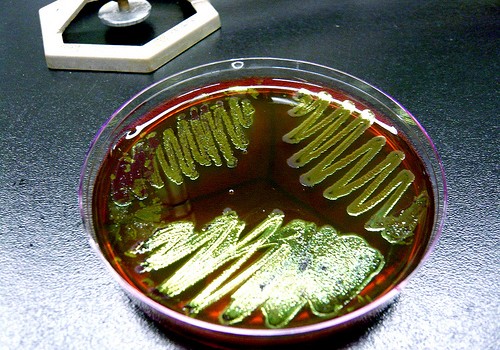
1. Escherichia Coli : A Major Cause of UTI
While the main micro-organisms that can be attributed to causing UTI are: - Escherichia coli; - Proteus mirabilis and; - Staphylococcus saprophyticus, E-coli is the main cause of most urinary tract infections(UTIs), and is considered to cause approximately 90% of fecal-related UTIs. The bacteria often travels from the rectum and the vaginal area where it can spread to the bladder, and urinary tract especially in women, where it then enters the urethra and the bladder. Taking precaution against this culprit means cleaning the private area (from front to back) after each bathroom visits and when bathing and showering. Performing the opposite(cleaning from back to front) spreads germs and bacteria to the urinary tract, resulting in nasty and annoying infections.
- Important notification about information and brand names used in this slideshow!
- Photo courtesy of azartaz by Flickr : www.flickr.com/photos/azartaz/3054755956/
- CDC.gov

2. Diet: Maintain A Berryful Diet To Beat UTIs
As mentioned in the previous slide, since UTIs are caused by bacteria in the stool, a person's diet can and may also increases the risk of getting UTIs by interfering with the normal bacterial flora that is present in human feces. An American Association of Clinical Nutrition study even indicated that women who consumed juices from berries such as cranberries and lingoberries experienced less cases of UTIs. Berries, because of their rich flavonols content help to inhibit the adhesion of bacteria to cells. Additionally, apples, plums and cherries carry high levels of epicatechin-another flavonol, however, berries contain higher content, and could explain why a diet consisting of berries reduces the risk and recurrent episodes of UTIs. Additionally, yogurt, keffir, and other fermented milk products with high levels of probiotics was also linked to low UTI incidents. This spurs another possibility that lactobacilli such as the type in fermented milk products can actually cushion the intestinal tract and protect, prevent and replace coliform bacteria.
- Important notification about information and brand names used in this slideshow!
- Photo courtesy of foodswings by Flickr : www.flickr.com/photos/foodswings/4590521732/
- Kontiokari, T., Laitinen, J., Järvi, J., Pokka, T., Sundqvist, K., and M.Uhari(2003). Dietary factors protecting women from urinary tract infection. Am J Clin Nutr March 2003 77(3) 600-604
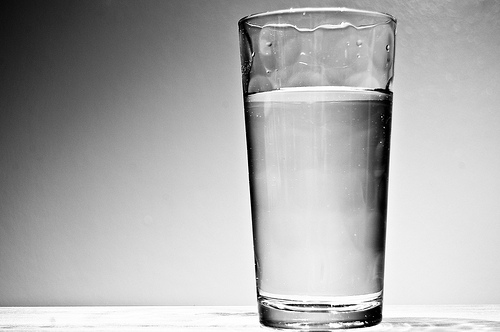
3. Stay Hydrated : Flush UTI From Your System
Summer is not the only time to stay hydrated. It is always a good habit to do so, and for many reasons including but not limited to UTIs. Unfortunately, dehydration also increases the risk of UTIs, and can cause one to be more susceptible to infections, especially if you are a woman, who is diabetic, are taking contraceptives, or are just simply proned to them. It is critical to stay hydrated always. Drinking sufficeint fluids will help to flush bacteria, fungi, yeast, and germs out of and away from the urethra. Many people are often unmotivated to commit to drinking especially water to ensure hydration. Adding light flavoured Chrystal Light or Nuun hydration tablets to water can help to make it more palatable and enticing , and they also replace important minerals and electrolytes that get depleted when we sweat.
- Important notification about information and brand names used in this slideshow!
- Photo courtesy of Ryan Hyde by Flickr : www.flickr.com/photos/breatheindigital/4788694752/
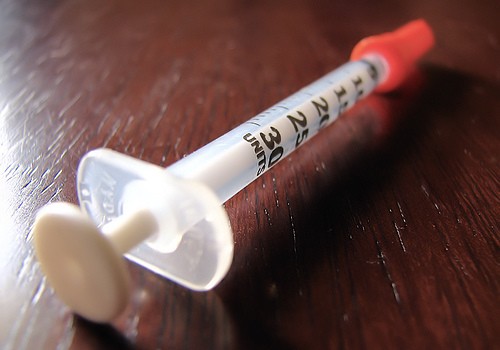
4. Diabetes: Means An Extra Dose Of Special Care To Prevent UTI
Now we know that it is mostly women that are often plagued with the discomforts of UTI. Although everyone can suffer from infections such as UTIs, diabetics are among the high risk groups for the infection, which is particularly more difficult to treat in those with the disease. To this end, consider the fact that women with diabetes are two to three times more likely to suffer from bladder infections, canker sores, and a host of other complications. In general, female diabetics are more likely to be hospitalized with UTI and related bladder infections than women without the disease. Further exacerbating the situation is that the bacteria tend to spread to the kidneys of those diabetic patients. This comes a a result of the poor circulatory system in those who are diabetic. This poor circulation slows down the ability to fight and protect again invading bacteria and infections, since the white blood cells are incapacitated and limited to quickly and effectively ingest the invading bacteria, the bacteria 'runs freely' creating havoc and chaos in the body. Also, diabetes can cause large amounts of urine to remain in the bladder due to poor circulation and contraction, which creates a 'breeding' ground...
Now we know that it is mostly women that are often plagued with the discomforts of UTI. Although everyone can suffer from infections such as UTIs, diabetics are among the high risk groups for the infection, which is particularly more difficult to treat in those with the disease. To this end, consider the fact that women with diabetes are two to three times more likely to suffer from bladder infections, canker sores, and a host of other complications. In general, female diabetics are more likely to be hospitalized with UTI and related bladder infections than women without the disease. Further exacerbating the situation is that the bacteria tend to spread to the kidneys of those diabetic patients. This comes a a result of the poor circulatory system in those who are diabetic. This poor circulation slows down the ability to fight and protect again invading bacteria and infections, since the white blood cells are incapacitated and limited to quickly and effectively ingest the invading bacteria, the bacteria 'runs freely' creating havoc and chaos in the body. Also, diabetes can cause large amounts of urine to remain in the bladder due to poor circulation and contraction, which creates a 'breeding' ground for bacteria to thrive. As such, regular screening and treating diabetic women for especially asymptomatic bladder infections can be advantageous towards the prevention of serious complication and further more dangerous infections in the future.
- Important notification about information and brand names used in this slideshow!
- Photo courtesy of Melissa P by Flickr : www.flickr.com/photos/ladytaz/1261174653/
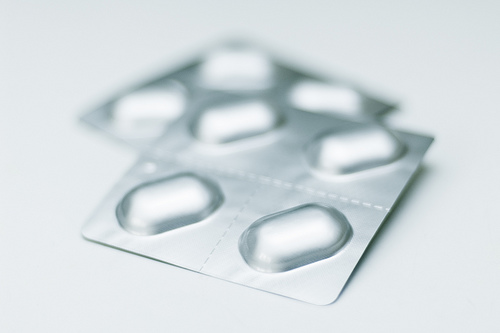
5. Antibiotics: Moderation Is Key
Thanks to research, medicine, and yes drugs-antibiotics. What would we do without them? They have certainly saved numerous lives and has been a major line of defense in public health against infectious and 'exotic' diseases and numerous plagues. Since UTIs are also caused from bacteria, they can also be prescribed and used in the treatment of UTIs. That said however, as with most things. Moderation is key. Abusing and overusing antibiotics is not just counter-productive. It can be very dangerous and life-altering. Although treating UTIs with antibiotics seem plausible, antibiotics can indeed be a double-edged sword for UTI sufferers if they are overused. In other word, they can do more harm than good. They wreak havoc in not just the urinary tract, but they can also destroy normal and beneficial bacterial flora in the gut , colonic and urinary tract, and can lead to conditions including but not limited to prolonged hemorrhoids, bleeding, recurring yeast infections, a weak bladder, and a host of other unwanted conditions.
- Important notification about information and brand names used in this slideshow!
- Photo courtesy of Camilo Rueda López by Flickr : www.flickr.com/photos/kozumel/2442389175/

6. Sexual Intercourse And Waiting Too Long To Urinate
A very common common cause of urinary tract infections is sexual intercourse. Again, this is because a woman's anatomy makes her more prone to UTIs, and during intercourse it is possible for vaginal bacteria to travel up to the urethra. However rare, an unfortunate number of women do suffer from UTI each time they have intercourse. Additionally, women with multiple sex partners, sometimes women when they change partners, or have intercourse on a frequent basis tend to suffer more from UTIs, compared to their more monagamous and celibate counterparts. Waiting too long to urinate is also a bad idea, and is the cause of bladder infections and UTIs. In order to accommodate unusual large volumes of stored urine, the bladder gets stretched beyond its capacity, and when the urine is released, it then contracts. In time, the bladder becomes weak, and it becomes more difficult to store and release urine. If urine is not released in its entirety, the 'leftovers' in the bladder increases one's risk of UTIs and other bladder infections, some of which could be irreversible
- Important notification about information and brand names used in this slideshow!
- Photo courtesy of you me by Flickr : www.flickr.com/photos/httpwwwyoumeflickrcom/8096556934/
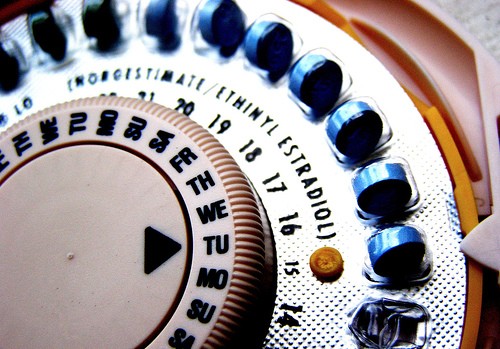
7. Contraceptives: Birth Control Pills Prevent Pregnancies-Not UTIs
The use of contraceptives can also increase the risks of developing an UTI. Many studies have indicated that since most women taking birth control pills are more likely to have frequent sex, it seems logical they would also be at a higher risk of contracting urinary tract infections, since as mentioned earlier, sexual intercourse is a trigger for UTIs. Additionally, since birth control pills contain the hormones estrogen and progesterone, their presence can also disrupt, initiate and excabate UTIs and related conditions. On that note, peri-menopausal and menopausal women because of low estrogen levels, are also at higher risks for developing UTIs.
- Important notification about information and brand names used in this slideshow!
- Photo courtesy of outcast104 by Flickr : www.flickr.com/photos/outcast104/1428798138/
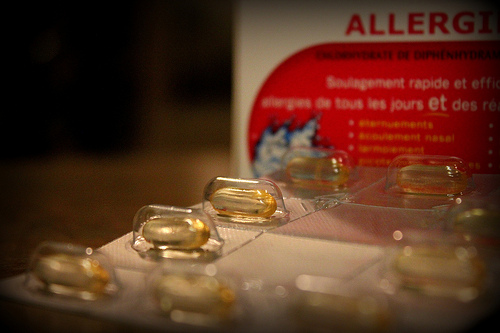
8. Allergies: UTI-Proof Your Life
Although not as common, urinary tract infections can be often triggered by allergic reactions to the surrounding environment, and especially from toiletries and intimate and cleansing products such as powders, soap, perfumes, deodorants, cleansing baths, douches and so on that many women use in the genital area. Such products can cause allergies many of which can potentially inflame the related tissues and facilitate the growth of pathogens and microorganisms in the genitalia, which eventually find their way to the urinary tract. As such, and all considered an ounce of prevention is easier and better than the cure. To this end, using hypoallergenic and organic products, drinking more cranberry juice and avoiding trigger foods, discussing contraceptive use as well as antibiotic treatments in depth with your doctor, urinating when nature calls rather than waiting, practicing cleaning from front to back, and cleaning the vaginal area after sex will all help reduce the development and recurrence of UTIs.
- Important notification about information and brand names used in this slideshow!
- Photo courtesy of Rina Pitucci by Flickr : www.flickr.com/photos/tilling-67/9943495094/
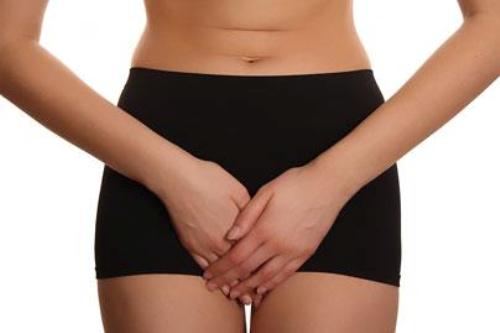
Women And UTIs: Why Women Are More Vulnerable
Women especially are at a higher risk and are more likely to suffer from urinary tract infections (UTIs) since their urethras are very short, making it much easier for bacteria from the rectal and vaginal areas to travel to the bladder. While as mentioned previously, there are many causes of urinary tract infections; the most common however, stems from E. coli bacteria and yeast which tend to spread from the rectum and the vagina to the urinary tract and folds. Since the bladder, the urethra, and the ureters are all part of, and make up the urinary tract system. This explains why UTIs predominantly occur in females, since the female urinary tract is in closer proximity to the vagina and the rectum.
- Important notification about information and brand names used in this slideshow!
- Photo courtesy of Raman Das Mahatyagi by Picasa : picasaweb.google.com/lh/view?q=urinary+tract&uname=109008901828086469253&psc=G&filter=1#5868092697074140274

Urinary Tract Infections(UTIs) : What To Expect And How To Suspect UTIs
A urinary tract infection (UTI) is a bacterial infection that usually occurs in the urinary tract system, which is responsible for the removal of waste in the body, and acts as a fliter to do so. Although the majority are not as serious, if left untreated, such infections can be rather annoying, painful and extremely uncomfortable, and can lead to serious complications. It is also quite common that if you have had one UTI, you could be proned to many more episodes going forward.There are many causes of urinary tract infections which include but are not limited to: antibiotics overuse, allergies, contraceptives, diet, diabetes, e-coli, yeast, dehydration, and even sexual activity. UTIs are often accompanied by in some cases, itching, burning during urination, pain before, during or after sex, a dire and frequent urge to urinate, a very pungent strong smell from urine, and even bleeding. Knowing the eight most common triggers, staying hydrated and how to avoid certain triggers that can lead to urinary tract infections will go a long way in helping to prevent the discomforts of UTIs.

























Your thoughts on this
Loading...